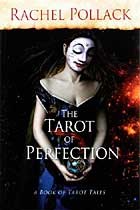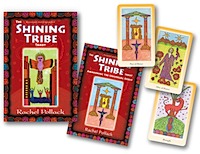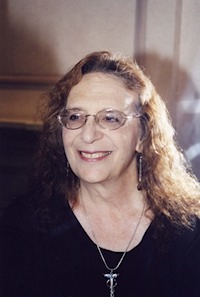By Melanie Harris
Recognized as one of the world’s leading authorities on all things Tarot, award-winning author Rachel Pollack is at it again. Just recently, she released Rachel Pollack’s Tarot Wisdom: Spiritual Teachings and Deeper Meanings (Llewellyn Worldwide, 2008), the long-awaited sequel to the now classic 78 Degrees of Wisdom. We couldn’t resist an opportunity to find out all we could about her latest Tarot offering, so we gave her a ring.
Tarot Reflections: There’s been a lot of buzz and excitement in the Tarot world about your new book, Rachel Pollack’s Tarot Wisdom. Are you excited?
Rachel Pollack: Yes, I’m very happy with it. I’m very pleased.
TR: Can you tell me more about what it’s about?
RP: Well, it’s really the first book I’ve done since 78 Degress of Wisdom, to go very deeply card by card, and to say, for me, what the Tarot is really about, what its spiritual messages are, what its various resonances are, its history. I really attempted to go back to the basics, and then take us further than I’d ever done before.
TR: So, why now? What made you decide that now was the right time for this book?
RP: What happened was I started teaching a class, and I really had not taught a class like that in a long time, going card by card, and doing the class kind of sparked me to see how much new material there was, how much I had discovered, how much research had been done, how much I’d learned over the years. I really feel like this book comes out of basically thirty years of learning.
TR: Do you enjoy teaching classes in person? Do you find that there are ways in which teaching in person is preferable to teaching through books?
RP: Yes, I do. There’s interaction in a class; in a book, you say everything. In a class, there’s all kinds of back and forth. It’s neat. Actually, in the book, there’s a couple of places where I asked classes what they thought about something, and I give a list [in the book] of how people responded.
TR: Have you ever had stage fright, was there ever a point in your life where you got nervous about teaching a class or giving a lecture?
RP: Well, the very first class, the very first workshop I’d ever done, this was way back in 1977 or ’78, I remember I was in my apartment, in Amsterdam, in the Netherlands. I was at my window looking out at the street, and I was hoping that nobody would show up, I was so frightened! But, you know, you do more, you really start to feel like you know what you’re doing, then you’re okay with it.
TR: I know you’ve written some things about how the Tarot relates to the Quaballah, and I was wondering, do you think the Tarot was designed with the Quaballah in mind, or do you think the correspondence is just a coincidence?
RP: I tend to think it’s a coincidence, but a lot of coincidences are truly magical, it perfectly fits, you know. So, some of [the coincidence] has to do with the fact that spiritual traditions are not arbitrary, they’re based on realities. They’re based on the fact that we have seven moving bodies in the sky, we have seven planetary spheres, we have ten fingers, there are four directions. And these things are fundamental, so, you know, it’s not an accident that they appear in all these different traditions, and [that’s why] the Tarot appears to somehow perfectly match all those different traditions.
TR: Do you think that when the Tarot was first invented, that it was intended to carry a deep spiritual meaning with it?
RP: I’m not sure it was intended to carry a systematic spiritual meaning, but certainly, the people who designed it, obviously designed it with allegorical images that were very meaningful. It’s interesting that very early, there’s a deck of cards called the Tarot of Mantegna, after the supposed artist, and that’s all about teaching spiritual lessons. …So it’s obvious that, whatever the “real” design [of the original Tarots], people perceived it right away as having spiritual meanings.
TR: What is something you find challenging, in regards to Tarot reading?
RP: One particular challenge is people who expect, you know, psychic fortunetelling, who expect that they’ll sit there and they won’t say what’s going on, and I will just magically tell them whatever has happened in their life and what’s going to happen in great detail. And that’s not what it’s about. So, I have to deal with people’s expectations of what that they’ve seen in movies, you know, expectations of the psychic fortuneteller.
It’s really funny, you’ll say to them, ‘Well, what questions do you have?’ and they’ll say, ‘Oh, I don’t have any questions, I just want to see what the cards say,’ and sometimes, that’s actually the case, but a lot of times, they’re lying, and what they’re really saying is, ‘You’re the psychic, you tell me!’
[The challenge is] not so much that people want me to do predictions, it’s that that there’s no dialogue, and if there’s no dialogue, I find it very difficult to do. There’s no connection being made, it’s just a person staring at me and waiting to hear me tell them everything.
TR: So, what do you do when that happens?
RP: Well, most people will open up, so if they see a first card or two, and they see it’s something they can connect to, they’ll start responding. Or, I plod on through, you know, say what I can see in terms of predictive kinds of things, if that’s what they’re asking for. Occasionally, I’ll just cancel the reading, especially if I feel like there are hostile attitudes!
TR: What is your favorite Tarot deck to use for readings?
RP: I have so many! I have my own Shining Tribe, so that’s obviously my favorite, but a lot of times, I will be moving through different decks. Recently, I did a reading with the Quantum Tarot, which uses science a lot, I like that. The Waite deck is something I go back to over and over. There are just so many different decks! There’s a very little known deck called the Transformational Tarot, there are actually two by that name, and they’re both good, but the one I’m thinking of has one-hundred cards, and I like it a lot, I love the style of it.
TR: What do you think about very contemporary Tarots?
RP: Well, some of them are not really meant to be used for readings or for any kind of spiritual purpose, they’re just meant to be fun. On the other hand, there’s a Tarot called the Halloween Tarot, which is like, these little cartoons, and everyone I know who reads with that deck, says how terrific it is. There’s something about it, it’s very direct, it’s easy to get messages from it. So some of these fun new decks can really be great!
TR: Now, on a more serious note, what do you think is the highest purpose of the Tarot?
RP: I would say it’s to show you who you really are, and to show you, basically, the truth about the world. I think a lot of times, we’re in denial about things, and what we think is real isn’t real, in a very fundamental kind of way. The tradition of the Tarot, spiritually, is a tradition of what I call anamnesia, which is the recovery from amnesia, which is to say, remembering who you really are. I think that’s what the Tarot, at its deepest level, is about.
Schedule a private Tarot consultation with Rachel, or learn more about Rachel Pollack’s Tarot Wisdom and all her other creations, including the recently released fairy tale and fable book Tarot of Perfection, at www.rachelpollack.com .
Rachel Pollack’s Tarot Wisdom is published by Llewellyn Worldwide,2008, and is available at the Llewellyn website, www.llewellyn.com


